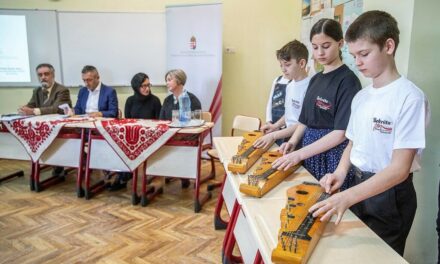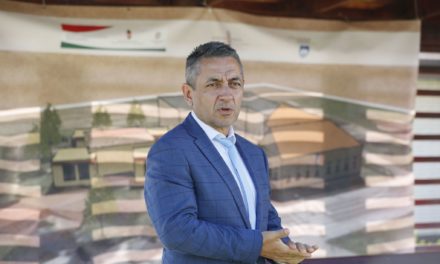A mother of four came forward with her unusual proposal in recent weeks.
He asked the members of the Facebook group Women Entrepreneurs in Transylvania whether there is openness to online Romanian language education for preschool children. Hajnalka Orbán's post received many supportive comments, encouraged by this, he looked for an instructor, recruited children and worked out the course of the lessons together with some of his fellow parents.
The online classes will start in a few days, and parents from all over Transylvania can sign up for them in the group created for this purpose.
For Hajnalka, learning the Romanian language during the summer - as the countryside is mostly inhabited by Hungarian-speaking people - was difficult, not to mention the experience that many young children in institutional education, as a result of compulsory reading and mother-tongue-like teaching, hate the Romanian language for life. In this way, he tried to prevent the problems and invited the children to learn through a screen, but in a more personal, playful, poetic, fairy-tale and song way.
In recent months, we have had no shortage of civic initiatives: recently a lady from Csikszereda wanted Zumba for retirees, and came forward with her request on social media platforms. As his idea was supported by the community, the training soon began, attracting 150 participants. Now we see Hajnalka's movement turning into a success story, as dozens of applications are coming in on Facebook, and parents are signing up several children from the same family for Romanian lessons.
For now, it seems that the group will start with 70 young children - he enthuses when we ask about his initiative. According to his experience, it is a big problem for Transylvanian Hungarians that they do not know the country's language properly, because they miss out on many opportunities as a result of language deficiencies. However, a foreign language heard in childhood and learned playfully can positively shape the attitude towards language learning.
"It's worth getting to know the Romanian language even before it is made compulsory at school or mentioned as undesirable in our environment"
– he shares his conviction with us, and then adds that the little things can make him fall in love with play, poetry, rhymes and songs. And later on, it can only be to their advantage if they speak another language besides their own. Because together with that, they get to know another culture, and their view of the world broadens. Especially when it comes to the language of the country.
Facebook live streaming, useful gadgets
The addiction of children to gadgets is one of the burning problems of our society, many parents complain, as they do not see what their child is doing online, they only perceive that the child does not eat, does not stay quiet, and trudges without the phone, tablet or TV. Today, we can read complaints in several moms' groups that children are distracted by TV in daycare, so it's no wonder that children of preschool age also surf the Internet to their heart's content and come across content intended for adults earlier, for example.
Hajnalka Orbán is also aware of this, as she and her husband try to create a screen-free life for their four children on their farm in Maros County. However, he is unshakable in his conviction that we must move forward with the changes in the world, so even gadgets can be used for the benefit of children, if under supervision, within certain time frames, the children learn useful things from the Internet.
One such useful thing could be the online Romanian class, which will initially be broadcast in the Facebook group created for this purpose, but it is not a secret that they aim to move their activities to YouTube. In a short 30-40 minutes, the teacher will call the children by name - thus making the educational process more personal - while talking to them creatively and interactively in Romanian. Although they initially tried to address parents of preschoolers, families enrolled children of various ages, so they will deal with 3-9-10-year-olds.
"You can still learn the language with rhymes and songs until the age of nine or ten. I am also aware that this will not make them fluent, but my goal was for them to constantly encounter the language, not just learn it from textbooks. So that they love it and the enthusiasm remains even when they have to learn lessons"
Hajnalka Orbán explains.
According to him, it is important that this age group hears their name when the teacher asks them to do activities, because in their understanding of the world the online and offline spaces are not yet sharply separated, for them every relationship is personal if they are addressed, listened to and praised.
"That's why we protect them from videos with dubious content. They can also become addicted to useless content, because their creators smuggle interaction into them, and young children feel that it is their own."
- says the mother, who by the way has already tried online language teaching with her children. They also take part in English classes, and she sees that the sessions have a developmental effect on her 4, 6 and 9-year-old children, and the fact that they can take part in the online classes from almost anywhere makes it easy to plan in the family's life.
"It's very difficult for someone who doesn't live in a city. You have to take the child on a trip, and the constant commuting involves half an hour of unpacking and packing, picking, and those families with several children are overwhelmed by the logistics."
he adds.
Online Romanian learning with a university private tutor
Orbán Hajnalka discussed his idea with several language schools, and there were even language schools that approached him after he published his post. However, as soon as he explained his goals in detail, none of the teachers accepted the private lessons,
“because bigger students usually have an advantage over smaller ones. It is easier to teach them, their results are more measurable, they can be tested in writing"
- she shares as a mother with a teacher's degree, emphasizing that games are missing from the lives of older people as well.
Since it was difficult to find a teacher, he introduced a former student to his plans: the university student takes private lessons as a member of the Cassini Association, so he was happy to teach Romanian online to the youngest children. By the way, the association was founded by young university students so that they could tutor their fellow students or those younger than them. Dalma, the future teacher, has already asked the opinion of the parents in the group, because it is important for her to educate the children on a topic that concerns them the most. He acquires puppets, learns nursery rhymes, stories, and songs so that he can introduce the young students to various topics in an enjoyable way.
For now, he will spend 30-40 minutes with the little ones once a week. One child's education costs 15 lei each time, but the amount to be paid is reduced if more children apply from a family.
"While English language classes are in high demand, Romanian language education is pushed into the background. This was my most important reason, I wanted English not to overtake Romanian so much that our children wouldn't know a word of Romanian in a few years. And get to the point where my generation did, that we didn't want to speak Romanian and didn't even want to hear about it, until we needed the language. We live in Romania, we have to speak the country's language, and how much easier it is if we don't learn it when we are forced to use it, but continuously, through experience"
says the mother of four.
Featured image: Illustration/ Adobe Stock












